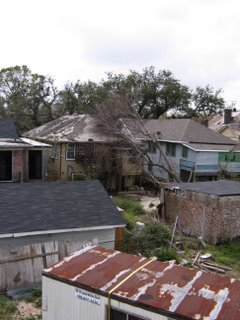3/29/06 Reactions to more Humana Festival plays
At last! Something real. An incredible performance. As gratifying and stunning as the other two Humana shows I've seen have been disappointing.
Very intimate theatre.
Single performer.
In Victor Jory theatre, my favorite of the three AT theatres: square acting space about 25' on a side surrounded on three sides by audience raked up from stage floor. 60-80 capacity?. White stage, very large pure white backdrop. White chair. Black performer. Soundscape plus effects (voices of mother, teacher, principal, etc.; ambient, heavy reverb on her voice at one point). Actor was miked which bothered me in the first moment and then not at all because it was well-done (subtle, unobtrusive) and didn't interfere with the performance at all (and the mike was really hidden this time).
She told the story of Low (diminutive of something), a much abused young black woman with a terrific intelligence and curiosity who suffers from many mental/emotional conditions, is on a lot of medication (when she can get it), goes in and out of institutions, is kicked out by her mother, becomes homeless and desperate, almost dies, ends up in an institution (again) where the story is left (final speech by the performer about what she calls "mental HIV", a plague which is treated by drugs but not addressed.
The storytelling was used to great effect. She narrated (1st person) as she lived/relived the scene with terrific physicality. She spoke to us all with clear direct voice and eye contact. Sharp and clean with simple, abrupt breaks as she moved to the next scene.
Terrific use of the space--very specific; lighting (general with sharp circular or rectangular specials when need) defined the space; alternated between staying in small, sharply defined spaces and using the entire space with great energy. Se moved very, very well--yes, she was quite definitely in her body. Clear, clean, as much movement as needed but no more.
I was quite struck with how available the performer was to the audience. Nothing blocked the exchange. Contrasted in this regard (in every regard) vividly from the apprentice show which I had just seen, in which the student actors pushed us away by virtue of the effort they made to "perform".
Simplicity was key. All the elements (sound, light, speech, movement) were clean, not cluttered.
Clear, committed movement even when walking to a new location and taking position to start a new scene (like Kate Valk though style of two shows very different). Nothing wasted, ever. Absolute commitment to choices made. Strong choices (in writing as well as acting/directing), never tentative. No sense of pulling back, ever, but also no forcing. Focused on the task.
I'm remember her description of seducing her boyfriend: it was so clear that the moves, facial expressions, vocal inflections, all were a very self-conscious code. Clear presentation.
The performance was intense and pretty long (80 minutes, at least). I was aware, near the end, of audience fatigue--and my own a bit, even though I was mesmerized--after she had been really crazy for a really long time.
(I'm sitting in the lobby writing this and the director is giving notes to the performer. I can't really hear what they're saying but I hear her repeating over and over, "Gotcha." Finally, on my way to the next performance, I interrupt them to tell them how very much I appreciated the piece, the acting, writing, directing. They both seemed genuinely appreciative.)
=============================
Quick response to Charr White's Six Years (Bingham Theatre, Sat. 4:00):
Very, very good show. Really good writing, very effectively naturalistic with lots of subtext which the actors employed. Acting was GOOD realism. Very clear, very present, terrific contact, terrific playing of actions. No schmacting. Story was very interesting, told in six-year gaps:1949, '55, '61, '67, and ending in 1973 (I'm pretty sure). Very tied into war and post-war U.S. development but very internal and domestic, too. Not the sort of thing I automatically enjoy but it was so very well done. Nice to see some "conventional" acting that's real and present. Restores my faith that it's possible, though I still prefer the non-realistic styles.
The opening scene was terrific: a husband and wife meet after a separation of six years. He went off to WWII, lived through it but didn't return for a couple of years after the war's end. Two very damaged people terrified of contact but needing it desperately (at least she does). Good, good acting. Extreme but not overdone. Terrific example of playing actions with the sense of really not knowing what would happen next.
All the acting was very good, as it should be (I begin to think that the unevenness of the first show was an anomolous combination of weak writing and weak (in parts) acting). Convincing effect of the passage of 24 years in the way the characters aged. But the main thing was the intense contact almost all the time between characters. As I think back now (next day), the acting wasn't at the level of professionalism that it should always be: not shatteringly brilliant, just doing the job very well. And Roger's right: It's some of the hardest kind of acting to do well.
The playwright, Sharr White, is a friend of Ron Bashford's (and I spoke to him last night only long enough to praise his show and send Ron's greetings). I was really very impressed with the ambition and craftsmanship of the writing. I'd like to look at the script, because I'm assuming that the broken, overlapping dialogue (Mamet-like) was specified in the writing. It required the actors to fill and justify the gaps and created terrific tension and contact between them.
=====================
Reactions to Humana apprentice show "Neon Mirage" (3/25):
Well, it was a real apprentince show, with the audience packed with friends and supporters. A welll-prepared pastiche of writing solicited from a number of much-produced playwrights themed on Las Vegas. The performers were young, earnest, confident, student actors who could sing and speak and move but none of whom seemed particularly present or even in their bodies in more than a technical sense (to use a couple of phrases I seem to be hearing and repeating a lot lately). They were acting their pants off, which is clearly what they were expected to be doing.
I enjoyed aspects of it. The writing was almost always interesting, clever, funny. Much of the acting was perfectly acceptable in the context of the material, the setting, the expectations. One scene, in which two men played two performing white tigers, was truly hilarious. And the performance space was good: arena lab theatre with steeply raked audience around a fairly small acting area with many entrances. Costuming was careful and pretty lavish. Staging was ok and sometimes clever (though got into sightline trouble a few times). Singers were always amplified with "hidden" mikes (why is this always the case? do they think we can't tell?). And the acting, as standard psychological (and in some cases presentational) acting, was never really embarrasing.
But by the end, I found myself vaguely depressed at watching the whole predictable, safe system perpetuating itself. These kids had real promise, but they were being fitted into an aesthetic that has been mired in a kind of smug self-satisfaction for so long.
Oh, come on! What is my problem? I'm a bit tired of this moralizing attitude of mine that seems to find almost everything lacking? Just because a performance doesn't fit into my personal aesthetic doesn't mean it's evil. Especially this weekend, when I'm at what is obviously a festival of mainstream, conventional theatre. I won't get far disapproving of everything.
So: On one hand, these kids were doing a good job, enjoying themselves watching their very hard work using some well-written texts pay off. It was entertaining. Good for them! On the other hand...well, I could say that it was a betrayal of everything that theatre and art could and should be. Which would be true. And the fact that they are students working at what is supposed to be a celebration of "new" work is pretty galling and sad.
But with the next piece, I'm going to make an effort to suspend judgement and see if I can just enjoy myself...
=====================
Reactions to The Scene (Bingham Theatre, Sat. 8:00)
Just the kind of play I don't like: Realism, contemporary New York white setting, sitcom-like jokes, kind of pointless in the end. Having said all that, the writing was truly hilarious at many points, including long misanthropic rants, and the acting & staging were fine, quite appropriate to the style of the play. And the apparently vacuous, beautiful temptress was really quite scary in her self-centeredness (as the play said over and over). So fine. Just, for me, really boring. Probably will be a huge success.
====================
Reaction: "Natural Selection" by Erik Coble, 2:30 Brown Theatre, 3/26/06
Play was a cartoonish satire set in a somewhat apocolyptic immediate future ("next week") where everybody in online all the time--looks a lot like now. Protagonist works for "Culture Fiesta", an Epcot parody. Problem is that an authentic Indian is needed to replace the dying performers. Protagonist ends up going to Arizona/New Mexico and shooting one with a tranquilizer dart who, when brought back to Orlando, proceeds to disrupt everything. Play climaxes in a huge hurrican when this world ends and people and animals prepare to climb through to the sixth world as in Navajo creation myth.
Started out great but the comic style got old pretty quickly. I think part of the problem was that it was 'way over-produced: staged in the largest theatre and the stage in this configuration was huge. Many fancy effects. I think the play would have been much more effective presented in a tiny theatre on a shoestring budget. Would have packed more of a punch and been funnier, too. Some of the satirical stuff was great (wife constantly online on a huge laptop (labeled "iLap"), son is always upstairs having a virtual education which includes being in a school play and taking swimming lessons. But it was a little play put on a huge stage with a huge budget.
=====================
Reaction: "Hotel Cassiopeia" by Charles Mee & SITI Company, dir. by Anne Bogart, 7:00 Jory Theatre, 3/26/06
At last I got to see an Anne Bogart/SITI production. About time. Although I have very mixed feelings, easily one of the most interesting of the festival offerings.
Entering the theatre: floor and large backdrop covered with old star chart (zodiac?) images, white on blue background. Striking. A teacher's desk (painted white? cream?) situated down center, at which sat the man who would play the central character with his head in his hands. Absolutely still until action began. I was seated at house left end of front row (d.s. audience section), very close to him.
The piece was visually striking, which was impressive given the relatively small space and the number of performers (seven?) and the number of objects. Still managed to have a spare look. As expected, the movement and composition were very conscious and very nice, and the way projections (of old movies) and sound were incorporated was very nice indeed. The play didn't tell a linear story (although there did seem to be a development of events in a way, culminating in the death of the artist's brother and his reaction. Some in the audience found it mystifying (later conversation) but it seemed very accessible to me. Helped to have read the notes, I'll admit.
I resisted it for a good while (in spite of my vow to just enjoy the performances on their own terms). It just seemed so precious, so "aesthetic". But of course the intent was to capture the artist's way of seeing and being in the piece itself, and the intense appreciation of ordinary objects, images, and words, raising them to the status of precious objects, was clearly his style, so I think the piece was a very successful in terms of form reflecting content; I just didn't share the aesthetic. At the time, I remember being reminded of the Open Theatre's style (or Chaikin's kind of speaking and writing at least); I loved it then and it seems annoying now. (Suddenly, I'm also reminded of descriptions in Wally Shawn's "The Fever" of opening Christmas presents or eating food--the love of beauty as a sign of refinement, of privilege.) For me, the characters of Pierrot and the Ballerina summed it up (though the characters themselves were more interesting than their images). However, eventually I managed to let go of this kind of resistance and let myself enjoy the beautiful imagery. I became quite moved by the end, as well as impressed by the technical mastery of the group (including
The acting (meaning, I suppose, verbal/emotional interaction) was very good. The characters were carefully and clearly deliniated, though there, too, there was a kind of preciousness that I found a bit much. Similar physical and vocal care and attention to detail as in the Wooster Group, but the choices were so much less interesting. Seemed to convey a real self-absorbtion and a kind of self-satisfied "artistry". Was that due to the nature of this piece or is it characteristic of all the company's work? Nevertheless, the acting also allowed for a good deal of empathy.
I had a brief but very interesting conversation with one of the actors (the Ballerina) after the performance, in which she said that they (or she) had a hard time with the piece at first for the same reasons as me: She said she just found it so "twee". I gather it was different from their other stuff. I have to get to their Midsummer Night's Dream at ASF next month.






